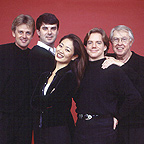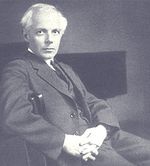
Date 1 March 2005 at 20.00 Venue The Vancouver Playhouse
Reviewer J H Stape
Spoleto Festival USA Chamber Music
Saint-Saens Violin and Piano Sonata, Op. 75 in D minor Brahms Trio for Clarinet, Cello, and Piano Bartok Contrasts for Clarinet, Violin, and Piano Smetana Piano Trio, Op. 15 in G minor
Violin Chee-Yun Cello Andres D'az Clarinet Todd Palmer Piano Steven Prutzman Host and Piano Charles Wadsworth
 |
|
Spoleto
Festival USA Chamber Music |
Begun in 1977 by the Italian composer Gian Carlo Menotti, "Spoleto Festival USA," held in Charleston, South Carolina, is an annual smorgasbord of the arts ranging from opera and dance to theatre and jazz. The 2005 Festival in one of the South's oldest, most gracious cities, will in May host some thirty chamber music concerts. By way of a warm up, Charles Wadsworth and his group of young musicians, brought an ample dose of Ol' Southern hospitality and fine music-making to this northern outpost.
Arriving on stage with arm in sling, Wadsworth, attacked by a large, heavy piece of luggage on his arrival at Vancouver International, announced several changes in the scheduled programme. The consummate Southern gentleman, with a Bourbon accent like William Faulkner's and looking like Colonel Sanders without the goatee, Wadsworth was a genial host throughout the evening, laying down an informality of atmosphere that suited the youthfulness of his musicians.
The evening got off to a flashy start with Saint-Saens's "Violin and Piano Sonata, Op. 75, in D minor." The sonata, which makes huge demands on the violin, is often last on the programme so as not to tire out the musicians. Youthful muscles easily conquered, however, from the richly melodic Allegro agitatato to the closing Allegro molto (more Presto, in fact). Spring-like in character aside from its soulful Adagio, the sonata is strong on the schazam factor, concluding in a blaze of technical fizz. The last movement's off-to-races character is an undoubted crowd pleaser, but this piece knowingly substitutes panache for musicality. Violinist Chee-Yun and pianist Steven Prutzman played their hearts out in this exuberantly French version of a hoe-down.
Brahms's "Trio for Clarinet, Cello, and Piano," opening with a sombre, stately Allegro develops into a wistful exploration of an inner landscape of considerable complexity and depth, and then returns to the world with an Andante partly composed of dance elements, a re-commitment to the outer, public world, presenting a decorous persona in retreat from emotional turbulence. Forces were well balanced, with cellist Andres D'az making the most of his opportunities. The forceful and dramatic Allegro, an urgent statement, was brightly and compellingly played.
w
w
w
.
r
e
v
i
e
w
V
a
n
c
o
u
v
e
r
.
o
r
g
 |
|
Bartók |
From the late-Romantic world of Brahms to Bartók's"Contrasts for Clarinet, Violin, and Piano," composed for Benny Goodman in 1938, was a giant step into the Modernist soundscape. Clarinetist Todd Palmer made his way through this dauntingly demanding work with skill and panache. The jazzy, strident, and somewhat vulgar elements of the "Recruitment Dance" movement were gloriously captured. Somewhat ironically titled, the "Relaxation" movement was a confection of eerie moments punctuated by brash outbursts, and the final "Sebes," in the aggressively fast Hungarian fiddler tradition, was by turns frantic and almost angry. Playing was brilliantly coloured.
Written after the death of his four-year-old child, Smetana's "Piano Trio, Op. 15 in G minor" is a study in intense anguish and reluctant reconciliation. Full of panic and brilliant effects, this major work got a thrilling reading, its calms and bleaknesses conveyed with equal conviction. The dignified dirge of the funeral march in the closing Presto movement lead into a high dramatic climax.The trio was impressively rendered, the musicians conveying with sensitivity this brooding music about the inescapability of destiny and mortality.
No greater contrast could there be than the encore, "I Got Rhythm Not," a playful, sometimes mischievous, and utterly engaging riff composed by Steven Prutzman for this unholy combination of instruments. Jagged rhythms, allusions to Gershwin, and out-and-out beep-bop allowed the musicians to "let down their hair." It was sheer fun, it was festive and life-loving, and the audience loved it. Seeing Host Charles Wordsworth turning a four-hand piano contribution into a three-hand one was another charming gesture in a night devoted to sharing musical pleasures. Come on back, y'all -- and soon!
© 2005 J. H. Stape